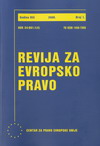THE FREE MOVEMENT OF GOODS POLICY V. NATIONAL PATENT RIGHTS
THE FREE MOVEMENT OF GOODS POLICY V. NATIONAL PATENT RIGHTS
Author(s): Zoran SretićSubject(s): Law, Constitution, Jurisprudence, Commercial Law
Published by: Удружење за европско право - Центар за право Европске уније
Keywords: intellectual property rights; free movement of goods; community law; copyrights and related rights
Summary/Abstract: From the approach of the European Court of Justice and its reasoning displayed above several points can be made, concerning the impact of the free movement of goods principle upon national patent rights: Any action taken by a patent holder before a national court stemmed from his patent to pursue the cross-border movement of patented goods shall be sustained as long as it is conducted within the specific subject matter of patent rights. The action in the national court to prevent the free trade, which exceeds beyond the scope of the patent's specific subject matter, shall be treated as a measure having equivalent effect to the quantitative restrictions on imports between Member States, thus prohibited by Article 28. Article 28 is directly applicable, hence it can be relied upon by a defendant to a patent infringement action; the Article, therefore, overrides the national patent rights unless a claimant shows that the defendant's conduct is covered by the specific subject matter of the patent. The specific subject matter of patent rights is limited by the European Court of Justice to the right of first sale of patented goods undertaken by a patent holder "either directly or by the grant of licences to third parties"; any further attempt of a patentee to control and restrain the circulation of such goods within the Common Market is not covered by the specific subject matter, therefore it shall not be upheld by a national court (Community-wide exhaustion of patent rights). Article 28, thus, has its overriding effect where national law would otherwise empower the right-owner to prevent parallel importation; apart from that, national patent law in each State alone determine the content and scope of the patent rights together with procedures and conditions for obtaining them "until there is a relevant harmonization Directive, or a Community right becomes a complete substitute." The appreciated scope of an exclusive patent licence is regulated by the Competition rules of the Treaty (Articles 81 and 82) prescribed to deal with private undertakings; the competition policy towards national patent rights is compatible with the free movement of goods policy (see the findings over the Maize Seed case covered within previous chapter). Note also that the Community-wide exhaustion of patent rights is confined to regulate cross-border movement of commodities within the Common Market (including the EEA). It does not apply to circulation of patented goods between non-member states and the EU. Except industrial producers, consumers and parallel importers as vagaries of the conflict with the EU amid, here the issue is rather more complex, as different context, players and policies are involved; the issue is to be tackled with grate consideration given to different and opposing interests that might occur within the World Trade Organization (WTO). So far, however, the European industrial producers have pleaded for rule of non-exhaustion at the external boundaries of the Common Market corroborating the case by the fact that it could encourage the sett-up of production and transfer of technology into the cheaper developing countries. Otherwise, the prospect would be hampered by consequent parallel importation from there. In addition, the EU would probably refrain from introducing international exhaustion unless it can secure a reciprocal move from other foreign trading partners. However, for the purposes of this work it is enough to stress that in principle unless "an effective rule of Community law on the matter is adopted, the applicable rule is determined by the law of the country of import." Free movement of goods policy v netional patent rights69Ključne reči: prava intelektualne svojine, slobodan promet robe, komunitarno pravo, autorska i srofna prava. Key words: intellectual property rights, free movement of goods, community law, copyrights and related rights
Journal: Revija za evropsko pravo
- Issue Year: 10/2007
- Issue No: 1
- Page Range: 67-96
- Page Count: 30
- Language: English

